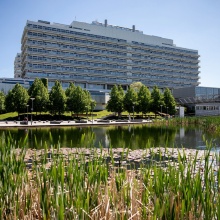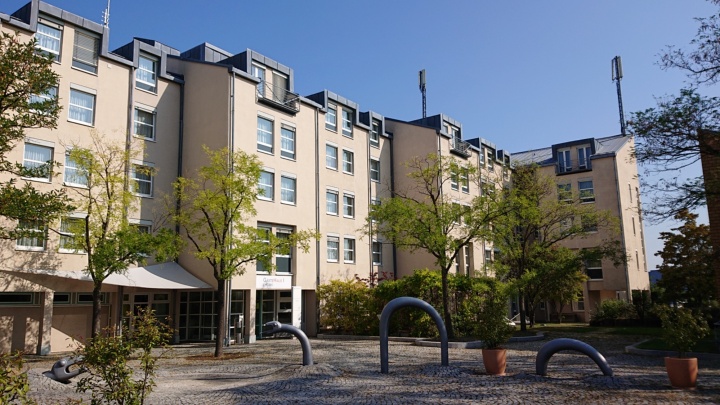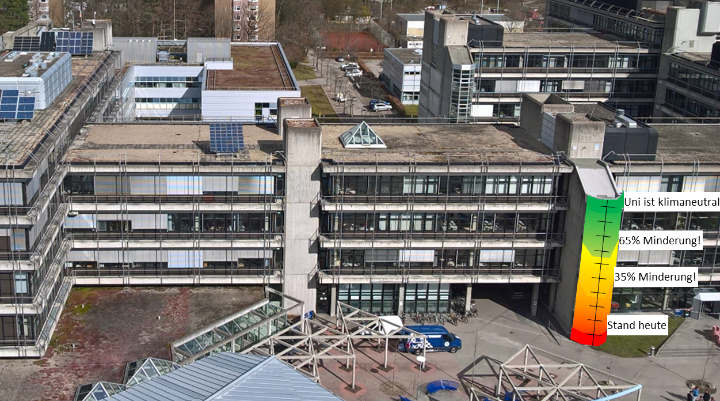The Living Lab “CampUS hoch i” at the University of Stuttgart will be funded by the state of Baden-Wuerttemberg and can move into its next implementation phase. Within the “Living Climate Lab” funding program, researchers and representatives from business and interested parties were called upon to submit innovative climate protection concepts. With “CampUS hoch i”, the University of Stuttgart has completed impressive climate-neutral renovation and redesign of university buildings on the Campus Vaihingen. In addition, there is a high level of participatory involvement as well as the integration of various stakeholders within and outside the university. The individual measures of the comprehensive sustainability strategy of the University of Stuttgart are coordinated in the Green Office, which is currently being established.
“Here at the University of Stuttgart, sustainability and climate protection take top priority at all levels, from research and teaching to our own business operation and our structures,” emphasizes Prof. Wolfram Ressel, Rector of the University of Stuttgart. The University of Stuttgart commits to the goal of “climate neutrality by 2035”. The Living Lab “CampUS hoch i [de]“ is now part of the state of Baden-Wuertemmberg’s funding program for climate protection.
Theresia Bauer, Minister for Science, explains: “As an interface between science, business, politics, and interested parties, Living Labs ‘made in BW’ make an important contribution to climate protection with their projects. With the Living Lab ‘CampUS hoch i’, the University of Stuttgart makes a valuable contribution, too. ‘CampUS hoch i’ not only focuses on different types of buildings and on intelligent technologies. In a variety of formats, scientists are also working specifically with the people who use, design, and manage buildings.”
Climate-neutral buildings: ecological building materials
To meet this goal, the project “CampUS hoch i” focuses on specific buildings of the University of Stuttgart and on the people who use them. The use of intelligent building technologies from the Institute for Building Energetics, Thermotechnology and Energy Storage (IGTE) not only achieves a reduction in energy consumption - for example, by making use of waste heat and low-temperature systems - but also an increase in well-being, and thus in productivity. Climate protection is consistently pursued right down to the selection of ecological building materials. Prof. Harald Garrecht, Head of the Institute of Construction Materials (IWB), explains: “Resource conservation and the maximum use of renewable raw materials form the basis of our work.”
CampUS hoch i – innovative and practice-oriented
“CampUS hoch i” is led by the Institute of Energy Economics and the Rational Use of Energy (IER). The institute is concerned with the integration of the buildings into the energy system as well as issues of intelligent system management. Prof. Kai Hufendiek, who is the overall manager of the project, knows that “the development of innovations is not enough.” He explains: “The theoretical goals will only be achieved if the behavior of the users is in line with them and the innovations are actually accepted.” The high level of expertise of the researchers at the University of Stuttgart is, therefore, supplemented by numerous collaborations, for example with architectural firms. Furthermore, the users of the Vaihingen campus and of the building infrastructure are themselves an integral part of the concept.
Participatory involvement
„With technology alone, climate neutrality cannot be achieved,“ says Prof. Cordula Kropp and broadens the perspective. According to her, technological possibilities are too often not realized, not used in a targeted manner or used only in addition, used incorrectly, and are bypassed. In contrast, a Living Lab helps to relate technological and human conditions to each other,” says Kropp. At “CampUS hoch i”, the idea of participatory involvement is therefore taken into account right from the beginning. To this end, the Center for Interdisciplinary Risk and Innovation Studies (ZIRIUS), which is headed by Prof. Kropp, contributes its expertise as a cross-faculty research center of the University of Stuttgart. Surveys conducted as part of the application process showed: Those involved in the concept as well as students and employees of the University of Stuttgart wanted, for example, a highly visible climate barometer in public spaces to provide information about progress toward climate neutrality and to show that this goal can ultimately be achieved together.
Students are involved
The Student Council of the University of Stuttgart, “stuvus”, also participates with a high level of commitment. „We are very pleased that the university assumes responsibility with the Living Lab ‘Campus hoch i’ and that we students can get involved,“ says David Kopp, Sustainability Officer at stuvus. He also underlines the importance of a single point of contact for all sustainability measures at the university, as will be the case in the Green Office. “Together we can make our university a workshop for the future that deals with the major challenges society is facing today,” says Vivien Langhans, who is David Kopp’s deputy.
Call for tender for the “Living Climate Laboratory”
The state of Baden-Wuerttemberg has been funding Living Lab projects since 2015. In the “Living Climate Laboratory” funding line, innovations in climate-friendly mobility, urban development, and the conservation of resources are supported right through to implementation. The funding amount announced in March for a term of three years amounts to a total of EUR six million for five Living Labs. The aim is to understand processes of change using scientific findings, develop models for action, and thus actively shape the transition toward climate neutrality.
Expert Contact:
Prof. Dr. Kai Hufendiek, Project overall manager "CampUS hoch i"
Phone: 0711 685-87800, E-Mail




